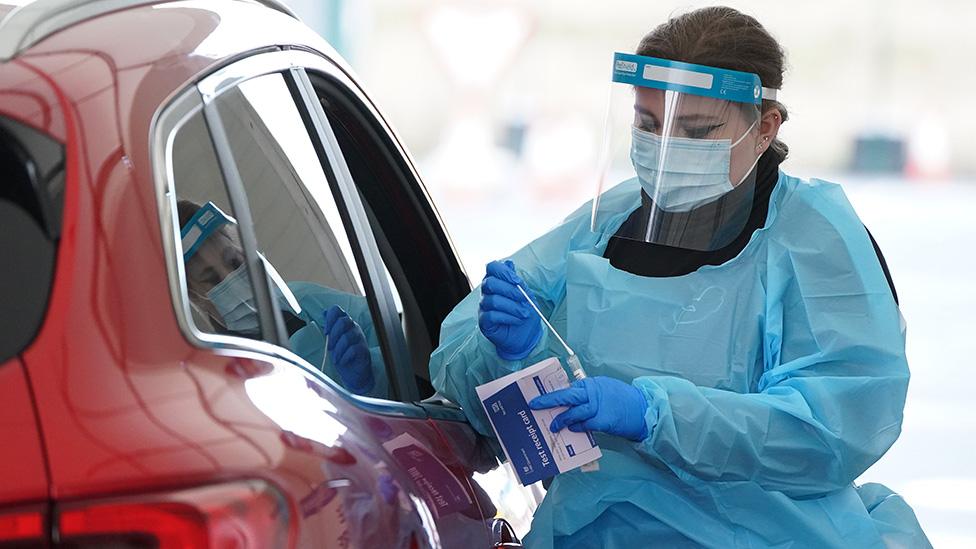Covid in Scotland: 'Congestion' warning over testing system
- Published

The Scottish government says the reporting of many test results has been delayed by the high number of PCRs being processed by labs
Scotland's Covid testing system faces "congestion" as schools and businesses reopen after the holidays, the deputy first minister has warned.
John Swinney told BBC Scotland there were likely to be "challenges" in some places as the demand for lateral flow and PCR tests rises in the coming days.
Pupils are being urged to take a test before returning to school.
Covid infections in Scotland hit another record high on Monday, with 20,217 people testing positive.
Reported cases fell slightly on Tuesday to 17,259, according to Scottish government figures. More than 35% of the tests carried out were positive.
The Scottish government also continued to warn that the reporting of many results has been delayed as labs have been processing a much higher volume of tests.
However, Deputy First Minister John Swinney told BBC Radio's Good Morning Scotland programme he believed Scotland's testing system could cope with the return to school.
"I think it can. Obviously it's important that individuals undertake those lateral flow tests, that is a critical part of our defence against Omicron," he said.
"I think what's encouraging is that the level of lateral flow device testing is high, many individuals are participating. The most recent data I've seen indicates that, in the last seven days, 85% of the population took part in lateral flow tests, which is very, very good.
"But obviously, as people return to school, staff, pupils, as people return to the workplace, it's important that they do that before they embark on it and then, of course, if they're positive, to take the necessary steps to receive a PCR test."

Asked whether there was enough PCR testing capacity to cope with demand, he said: "I think there will be congestion at different points.
"It's impossible for me to give you a guarantee that at individual test sites there will not be challenges in particular geographies, but I'm confident that we have got a strong testing proposition."
The seven-day average of cases rose from 6,671 on 21 December to 10,387 on 28 December in Scotland, according to the Scottish government.
Public health expert Dr Christine Tait-Burkard, of the University of Edinburgh, said it was "almost inevitable" that Omicron cases would rise still further when pupils returned to school, given the transmissibility of the new variant.
Dr Tait-Burkard, a research fellow at the university's Roslin Institute, said cases were likely to increase, even with mitigating measures.
She told Good Morning Scotland: "It's almost without a doubt that, when schools return, our numbers will increase further.
"The virus is very, very prominent in the population at the moment.
"The week before last, one in 40 people in Scotland had the virus, and that means as soon as schools return, with such a high transmissibility of Omicron, the numbers will rise further, that is almost inevitable."
Asked whether this would happen even with mitigations such as mask-wearing and increased ventilation, she said: "Even with mitigations. As we've seen in the past they help to slow things down... but it's both children returning to school, parents returning to workplaces, which will help the virus spread further than it has before."
Hospital figures 'optimistic'
Figures published by the Scottish government on Tuesday, external show that the number of people in hospital with Covid is also continuing to rise, going up from 1,031 to 1,147, with 42 people being treated in intensive care.
However, Jillian Evans, the head of health intelligence for NHS Grampian, said there were indications that fewer people infected with the Omicron strain required hospital treatment and that hospital stays were getting shorter.
"The length of stay certainly seems to be lower and that would indicate that people aren't as ill as they were with other variants of Covid," she told BBC Radio Scotland's Lunchtime Live.
"Another thing to look at is the hospitalisation rate... That's been coming down and it's continuing to come down, so I think the number of people who are converting from being infected to being hospitalised is really quite low now and much lower in the last month or so.
"Those two things give you some cause for optimism."

